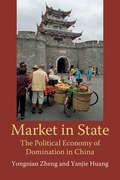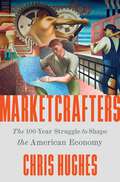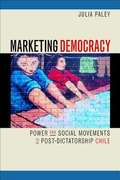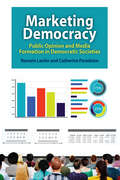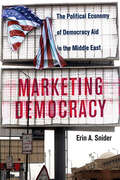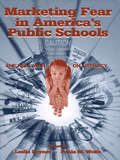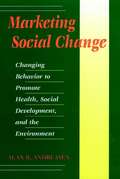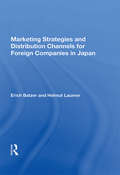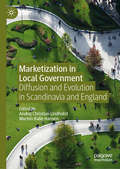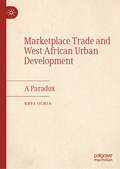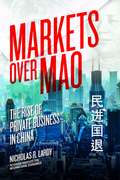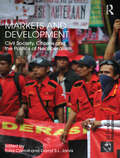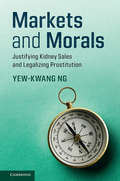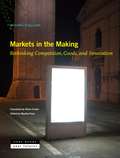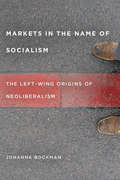- Table View
- List View
Market in State: The Political Economy of Domination in China
by Yongnian Zheng Yanjie HuangFocusing on the evolving relations between the state and market in the post-Mao reform era, Yongnian Zheng and Yanjie Huang present a theory of Chinese capitalism by identifying and analyzing three layers of the market system in the contemporary Chinese economy. These are, namely, a free market economy at the bottom, state capitalism at the top, and a middle ground in between. By examining Chinese economic practices against the dominant schools of Western political economy and classical Chinese economic thoughts, the authors set out the analytical framework of 'market in state' to conceptualize the market not as an autonomous self-regulating order but part and parcel of a state-centered order. Zheng and Huang show how state (political) principles are dominant over market (economic) principles in China's economy. As the Chinese economy continues to grow and globalize, its internal balance will likely have a large impact upon economies across the world.
Market, Ethics and Religion: The Market and its Limitations (Ethical Economy #62)
by Niels KærgårdThis book deals with the basic question of what money can and cannot buy and offers an analysis of the limitations of the market mechanism. Few concepts are as controversial as religion and the market mechanism. Some consider religion to be in conflict with a modern rational scientific view of life, and thus as a contributory cause of harsh conflicts and a barrier to human happiness. Others consider religious beliefs as the foundation for ethics and decent behaviour. Similar, a number of neoliberal writers acclaimed the market mechanism as one of the greatest triumphs of the human mind, and saw it as the main reason why rich countries became rich. Others are extremely skeptical and stress how this mechanism has result in big multinational firms with powerfully rich owners and masses of poor low-paid workers. Researchers from various fields - economists, social scientists, theologians and philosophers - handle these questions very differently, applying different methods and different ideals. This book offers a synthesis of the different viewpoints. It deals with economists’, theologians’ and philosophers’ differing thoughts about the market and its limitations.
Marketcrafters: The 100-Year Struggle to Shape the American Economy
by Chris HughesA revelatory and unexpected history of the rise of American capitalism—and an argument that entrepreneurial leaders in government, not the mythical &“free market,&” created the most dynamic economy the world has ever known.For many decades, a sacred myth has ruled the minds of policymakers and business leaders: free markets, untouched by the soiled hands of government, bring us prosperity and stability. But it&’s wrong. American policy makers, on the right and the left, have spent much of the past century actively shaping our markets for social and political goals. Their work behind the scenes and out of the headlines has served as a kind of &“marketcraft,&” resembling the statecraft of international relations. Economist and writer Chris Hughes takes us on a journey through the modern history of American capitalism, relating the captivating stories of the most effective marketcrafters and the ones who bungled the job. He reveals how both Republicans and Democrats have consistently attempted to organize markets for social and political reasons, like avoiding gasoline shortages, reducing inflation, fostering the American aviation and semiconductor industries, fighting climate change, and supporting financial innovation. In recent decades, the art of marketcraft has been lost to history, replaced by the myth that markets work best when they are unfettered and free. Hughes argues that by rediscovering the triumphs and failures of past marketcrafters, we can shape future markets, such as those in artificial intelligence and clean power production, to be innovative, stable, and inclusive. Groundbreaking, timely, and illuminating, this is a must-read for anyone interested in economic policy, financial markets, and the future of the American economy.
Marketing Democracy: Power and Social Movements in Post-Dictatorship Chile
by Julia PaleyMarketing Democracy shows how the exercise of power and the strategies of social movements transformed with the transition from a military to an elected-civilian regime in Chile. The term "marketing democracy" refers first to how contemporary democracies are shaped by transnational market forces, and second to how politicians have promoted democracy with the twin goals of attracting foreign capital and diminishing social movements.
Marketing Democracy: Public Opinion and Media Formation in Democratic Societies
by Catherine Paradeise Romain LauferThis book examines mass marketing techniques in a political rather than economic context. The authors' thesis remains persuasive: democratic politics, precisely because it requires mass support for its legitimation, increases the need for public opinion to be channelized and focused. This is precisely the task of marketing in the political process.Increasingly, advanced societies are involved in symbolic rather than direct forms of struggle. As a result, management of ideas becomes crucial to both political survival and economic expansion. Romain Laufer and Catherine Paradeise argue that public opinion and media formation is built into the fabric of Western political culture, dating from the Sophists in ancient Greece through Machiavelli in the aristocratic baronies of pre-capitalist Europe. With the rise of the bureaucratic-administrative state in the West, the need for persuasive public opinion analysis became part of the fabric of the advanced Western democratic and capitalist nations.The volume benefits from authors trained and familiar with the traditions of both the United States and Europe. They are able to consider contrasts in marketing styles as well as continuities of contents among advanced nation-states. No simple "how-to" manual, this bracingly different volume discusses its subject with an easy command of the philosophical and cultural literatures, as well as the major classics of economics, sociology, and political science.
Marketing Democracy: The Political Economy of Democracy Aid in the Middle East (Cambridge Middle East Studies #64)
by Erin A. SniderFor nearly two decades, the United States devoted more than $2 billion towards democracy promotion in the Middle East with seemingly little impact. To understand the limited impact of this aid and the decision of authoritarian regimes to allow democracy programs whose ultimate aim is to challenge the power of such regimes, Marketing Democracy examines the construction and practice of democracy aid in Washington DC and in Egypt and Morocco, two of the highest recipients of US democracy aid in the region. Drawing on extensive fieldwork, novel new data on the professional histories of democracy promoters, archival research and recently declassified government documents, Erin A. Snider focuses on the voices and practices of those engaged in democracy work over the last three decades to offer a new framework for understanding the political economy of democracy aid. Her research shows how democracy aid can work to strengthen rather than challenge authoritarian regimes. Marketing Democracy fundamentally challenges scholars to rethink how we study democracy aid and how the ideas of democracy that underlie democracy programs come to reflect the views of donors and recipient regimes rather than indigenous demand.
Marketing Fear in America's Public Schools: The Real War on Literacy
by Leslie Poynor Paula M. WolfeMarketing Fear in America's Public Schools: The Real War on Literacy is an eye-opening examination of the real world consequences of the political pressures and influences on teachers today. In particular, it looks at how the political actions of the conservative right disempower and control teachers, school districts, parents, and children through an atmosphere of fear used as a strategy to ensure that schools follow the conservative political agenda supporting and imposing mandates such as increased accountability, high stakes testing, and direct intense direct-instruction phonics programs. The book offers a unique look not at not only what the conservative factions are doing but why. The volume includes chapters on: *resistance to the conservative agenda; *national and/or federal agendas and actions that directly or indirectly contribute to the privatization and corporate control of public education; *the linkage of federal policy to the disappearance or promotion of particular philosophical and pedagogical approaches; and *the role of the media in perpetuating the agendas of the corporate and political right. Many teachers across the U.S. are frustrated and angry about the outside legislative constraints placed on their work, but at the same time frightened of losing their jobs and/or being faced with a lawsuit. The book's premise is that one must understand the motives behind the current educational "reforms" in order to resist them. The editors and contributors envision the volume as a voice for an alternative to compliance with unreasonable mandates--and thus as a message of hope. Marketing Fear in America's Public Schools: The Real War on Literacy is important reading for teachers; teacher educators; education students; school administrators and other education professionals; researchers concerned with literacy, critical theory, pedagogy, and educational policy; and parents and community activists concerned with the politics of schooling and school reform. It is will serve well as a text in a range of courses across the field of education. A Web site for the book can be found at http://www.erlbaum.com/poynor.
Marketing Management and Communications in the Public Sector (Masters in Public Management)
by Martial Pasquier Jean-Patrick VilleneuveThis updated edition of Marketing Management and Communications in the Public Sector provides a thorough overview of the major concepts in public sector marketing and communications, two fields that have continued to grow in importance for modern public administrations. With extended coverage of topics such as social marketing and institutional communication, the authors skilfully build on the solid foundations laid down in the previous edition. Replete with real-world case studies and examples, including new material from the USA, Australia, and Asia, this book gives students a truly international outlook. Additional features include exercises and discussion questions in each chapter and an illustrative extended case study. This refreshed text is essential reading for postgraduate students on public management degrees, and aspiring or current public managers. The Open Access version of this book, available at http://www.taylorfrancis.com/books/e/9781315622309, has been made available under a Creative Commons Attribution-Non Commercial-No Derivatives 4.0 license.
Marketing Schools, Marketing Cities: Who Wins and Who Loses When Schools Become Urban Amenities
by Maia Bloomfield CucchiaraDiscuss real estate with any young family and the subject of schools is certain to come up--in fact, it will likely be a crucial factor in determining where that family lives. Not merely institutions of learning, schools have increasingly become a sign of a neighborhood's vitality, and city planners have ever more explicitly promoted "good schools" as a means of attracting more affluent families to urban areas, a dynamic process that Maia Bloomfield Cucchiara critically examines in Marketing Schools, Marketing Cities. Focusing on Philadelphia's Center City Schools Initiative, she shows how education policy makes overt attempts to prevent, or at least slow, middle-class flight to the suburbs. Navigating complex ethical terrain, she balances the successes of such policies in strengthening urban schools and communities against the inherent social injustices they propagate--the further marginalization and disempowerment of lowerclass families. By asking what happens when affluent parents become "valued customers," Marketing Schools, Marketing Cities uncovers a problematic relationship between public institutions and private markets, where the former are used to leverage the latter to effect urban transformations.
Marketing Social Change. Changing Behavior to Promote Health, Social Development, and the Environment
by Alan R. AndreasenApplies marketing techniques to social issues.
Marketing Strategies And Distribution Channels For Foreign Companies In Japan
by Erich BatzerThis book gives an account of concrete market situations and describes marketing strategies and distribution channels of German manufacturing firms, German and foreign trading firms and Japanese partner firms on the Japanese market in important product areas.
Marketing US Foreign Policy in the MENA Region: American Presidents vs Non-State Actors (Political Campaigning and Communication)
by Fouad TouzaniThe book examines how US media, public opinion, interest groups and think tanks respond to US Presidents’ attempts to market their foreign policies in the MENA Region. The scope of the analysis extends from the war on terror to the so-called Arab Spring. It focuses on some case studies including the Arab-Israeli conflict and the Iran nuclear deal. The book fills a gap in the literature pertaining to analyzing US foreign policy in the MENA area from a political communication perspective rather than from IR or a political-theory angle, which remains the dominant literature. In so saying, the book will appeal to students, researchers as well as thinks tanks and policy makers.
Marketing Violence: The Affective Economy of Violent Imageries in the Dutch Republic (Elements in Histories of Emotions and the Senses)
by Karel Vanhaesebrouck Cornelis van der Haven Inger Leemans Frans-Willem KorstenThis Element describes the development of an affective economy of violence in the early modern Dutch Republic through the circulation of images. The Element outlines that while violence became more controlled in the course of the 17th century, with fewer public executions for instance, the realm of cultural representation was filled with violent imagery: from prints, atlases and paintings, through theatres and public spectacles, to peep boxes. It shows how emotions were evoked, exploited, and controlled in this affective economy of violence based on desires, interests and exploitation. This title is also available as Open Access on Cambridge Core.
Marketing Warfare
by Al Ries Jack Trout"A business book with a difference: clear-cut advice, sharp writing and a minimum of jargon." Newsweek "Revolutionary! Surprising!" Business Week "Chock-a-block with examples of successful and failed marketing campaigns, makes for a very interesting and relevant read." USA Today
Marketing the City: The role of flagship developments in urban regeneration
by H. SmythThis book assesses the value of flagship developments and draws out lessons for best policy and practice. It looks at marketing strategies and the sales process for flagship developments and the areas in which they are located for urban regeneration. It discusses the management of marketing strategies and the development through the policy formulation, project implementation and policy/project evaluation. The author examines the strategies to date of 'marketing the city' and the conceptual scope and limits for developing the concept. He also looks at the extent to which people can be integrated into the urban 'product' and the advantages and disadvantages of this. Finally the impact of all these issues is assessed for the policy makers, planners, developers, architects and city authorities.
Marketing without Advertising: Brand Preference and Consumer Choice in Cuba (Routledge Advances in Management and Business Studies)
by Emilio Morales Joseph L. ScarpaciIn 1993, in order to stop an economic freefall on the island of Cuba, Fidel Castro’s government reluctantly instituted a series of reforms to compensate for the demise of foreign aid from Moscow. These policies ushered in a broad spectrum of national and international consumer products and services previously unknown to islanders. In a few short years, Cubans were seeing foreign brands among consumer durables and a broad array of logos brought in by tourists. Today, nearly two decades into these limited market reforms, no systematic research has explored consumer brand awareness among 11 millions Cubans living just 90 miles from the United States. The paucity of academic research stems from the challenges of conducting public/consumer opinion, and official state policy contends that consumer wants and needs are satisfied by either a series of generic and Cuban-made brands, or by independent entrepreneurs who provide brandless products and services. Marketing without Advertising analyzes the role, narratives, and behaviour of consumption in Cuba since 1959. It documents how consumer behaviour has changed since the pre-revolutionary period, with special focus on the early 1990s. The book documents the shift from moral-based rewards in the early years of the Revolution, to the rise of material-based incentives. Cubans have long been exposed to foreign mass media in the form of movies, music videos, cable television shows. Although the Internet is highly regulated, the Cuban Diaspora in exile brings back clothing, personal care products, electronic goods, and magazines that increase the awareness of brand logos, jingles, products, and services. These and related findings from the authors' primary research are ripe with marketing implications such as substitution effects, price elasticity, latent demand for certain products and services, and consumer behaviour.
Marketization in Local Government: Diffusion and Evolution in Scandinavia and England
by Andrej Christian Lindholst Morten Balle HansenMarketization is one of the most powerful reform doctrines reshaping the organization of public service delivery throughout the last four decades. This book revisits conventional ideas and models of marketization and compares how these have diffused and evolved across municipalities in England and Scandinavia. The book highlights the paths and impacts of marketization as diverse and dynamic and asks us to reconsider what and how we think about marketization. The content of the book is co-authored by researchers from four countries and builds upon comparable surveys and case-studies from two longstanding ‘spearhead’ services – parks and roads – for the implementation of marketization. The book appeals to scholars and policy makers with interests in discussions about the history and future of marketization in an international perspective.
Marketplace Trade and West African Urban Development: A Paradox
by Krys OchiaThis book analyses how informal economy traders and the marketplace institution dominate the local economy in African cities. According to the World Bank, being an African reduces the probability that an individual is an entrepreneur in the manufacturing sector by more than 95 percent. Exporting unprocessed strategic raw materials and importing large volumes of finished goods stagnate Africa’s informal sector while creating formal jobs overseas. This suggests employment increases in distributive trade and persistence of the marketplace institution in reducing urban unemployment and income inequality. However, there is limited knowledge of the men and women with permanent stalls in large urban marketplaces that function daily as a temporary city within a city, even though they are the major actors in distribute trade. More important their daily out-of-stall contacts resulting from maintaining complex social and economic relationships that determine the financial health of family, business, and the economy are generally unexplored and largely unknown, but have significant unintended consequences on the urban mobility system. Researchers, planners, development practitioners and policymakers have, therefore, not focused their attention and considered the impacts of the powerful economic institution – marketplaces and traders - in framing transport planning processes and urban development policies, and that is the paradox surrounding marketplace trade and urban development in West Africa.
Markets And Civil Society
by Victor Pa©rez-DaazThe nature of the currently emerging European society, which includes the economic and social transformation of Eastern and Central European countries, has been hotly debated. At its center is the relationship between markets and civil society within political and social contexts. The contributors to this volume offer perspectives from various disciplines (the social sciences, conceptual history, law, economics) and from several European countries in order to explore the ways in which markets influence various forms of civil society, such as individual freedom, social cohesion, economic effectiveness and democratic governance, and influence the construction of a civil society in a broader sense.
Markets And Civil Society
by Victor Pérez-DíazThe nature of the currently emerging European society, which includes the economic and social transformation of Eastern and Central European countries, has been hotly debated. At its center is the relationship between markets and civil society within political and social contexts. The contributors to this volume offer perspectives from various disciplines (the social sciences, conceptual history, law, economics) and from several European countries in order to explore the ways in which markets influence various forms of civil society, such as individual freedom, social cohesion, economic effectiveness and democratic governance, and influence the construction of a civil society in a broader sense.
Markets Over Mao: The Rise of Private Business in China
by Nicholas LardyChina's transition to a market economy has propelled its remarkable economic growth since the late 1970s. In this book, Nicholas R. Lardy, one of the world's foremost experts on the Chinese economy, traces the increasing role of market forces and refutes the widely advanced argument that Chinese economic progress rests on the government's control of the economy's "commanding heights." In another challenge to conventional wisdom, Lardy finds little evidence that the decade of the leadership of former President Hu Jintao and Premier Wen Jiabao (2003–13) dramatically increased the role and importance of state-owned firms, as many people argue. This book offers powerfully persuasive evidence that the major sources of China's growth in the future will be similarly market rather than state-driven, with private firms providing the major source of economic growth, the sole source of job creation, and the major contributor to China's still growing role as a global trader. Lardy does, however, call on China to deregulate and increase competition in those portions of the economy where state firms remain protected, especially in energy and finance.
Markets and Development: Civil Society, Citizens and the Politics of Neoliberalism (ISSN)
by Toby Carroll and Darryl S.L. JarvisMarkets and Development presents a series of critical contributions focused on the political relationship between citizens, civil society, and neoliberal development policy’s latest form. The dramatic increase of ‘access to finance’ investments, newly gender-sensitive approaches to building neoliberal labour markets, the universal promotion of public-private partnerships, and the ‘development financing’ of extractive industries, have all seen citizens, social movements, and NGOs variously engaged in, and against, neoliberalism like never before. The precise form that this engagement takes is conditioned by both the perceived and real opportunities, and the risks, of an agenda which seeks to intern ‘emerging’ and ‘frontier markets’ deep within a concretising world market, with transformative repercussions for both those involved and, notably, for state-society relations. The contributors to this volume focus on essential aspects of the contemporary neoliberal development agenda and its relationship to and with citizens and civil society, tackling questions related to the roles that various actors within civil society in the underdeveloped world are playing under late capitalism, and how these roles relate to current efforts to establish and extend markets, and market society more broadly, in a neoliberal image. This book was originally published as a special issue of Globalizations.
Markets and Morals: Justifying Kidney Sales and Legalizing Prostitution
by Yew-Kwang NgConsidering efficiency, equality, and morality, this book argues for qualified market expansion, particularly in legalizing kidney sales and prostitution. Legalizing prostitution will benefit both men and women, as argued in a chapter jointly written with Yan Wang. Blood donation without monetary compensation can still result in adequate blood supply if schools educate children that blood donation can actually benefit a donor's health. As a society becomes more advanced, with higher incomes and a better educated populace, more activities can be subject to market exchange, with gradual popular acceptance. Without serious misinformation and irrationality, inequality/fairness as such cannot be a valid reason for limiting the scope of the market. The book supports the use of markets to increase efficiency while also increasing the effort to promote equality, making all income groups better off.
Markets in the Making: Rethinking Competition, Goods, and Innovation (Near Future Series)
by Michel CallonSlicing through blunt theories of supply and demand, Callon presents a rigorously researched but counterintuitive model of how everyday market activity gets produced.If you’re convinced you know what a market is, think again. In his long-awaited study, French sociologist and engineer Michel Callon takes us to the heart of markets, to the unsung processes that allow innovations to become robust products and services. Markets in the Making begins with the observation that stable commercial transactions are more enigmatic, more elusive, and more involved than previously described by economic theory. Slicing through blunt theories of supply and demand, Callon presents a rigorously researched but counterintuitive model of market activity that emphasizes what people designing products or launching startups soon discover—the inherent difficulties of connecting individuals to things. Callon’s model is founded upon the notion of “singularization,” the premise that goods and services must adapt and be adapted to the local milieu of every individual whose life they enter. Person by person, thing by thing, Callon demonstrates that for ordinary economic transactions to emerge en masse, singular connections must be made.Pushing us to see markets as more than abstract interfaces where pools of anonymous buyers and sellers meet, Callon draws our attention to the exhaustively creative practices that market professionals continuously devise to entangle people and things. Markets in the Making exemplifies how prototypes, fragile curiosities that have only just been imagined, are gradually honed into predictable objects and practices. Once these are active enough to create a desired effect, yet passive enough to be transferred from one place to another without disruption, they will have successfully achieved the status of “goods” or “services.” The output of this more ample process of innovation, as redefined by Callon, is what we recognize as “the market”—commercial activity, at scale.The capstone of an influential research career at the forefront of science and technology studies, Markets in the Making coherently integrates the empirical perspective of product engineering with the values of the social sciences. After masterfully redescribing how markets are made, Callon culminates with a strong empirical argument for why markets can and should be harnessed to enact social change. His is a theory of markets that serves social critique.
Markets in the Name of Socialism
by Johanna BockmanThe worldwide spread of neoliberalism has transformed economies, polities, and societies everywhere. In conventional accounts, American and Western European economists, such as Milton Friedman and Friedrich von Hayek, sold neoliberalism by popularizing their free-market ideas and radical criticisms of the state. Rather than focusing on the agency of a few prominent, conservative economists,Markets in the Name of Socialismreveals a dialogue among many economists on both sides of the Iron Curtain about democracy, socialism, and markets. These discussions led to the transformations of 1989 and, unintentionally, the rise of neoliberalism. This book takes a truly transnational look at economists' professional ideas over 100 years across the capitalist West and the socialist East. Clearly translating complicated economic ideas and neoliberal theories, it presents a significant reinterpretation of Cold War history, the fall of communism, and the rise of today's dominant economic ideology.
